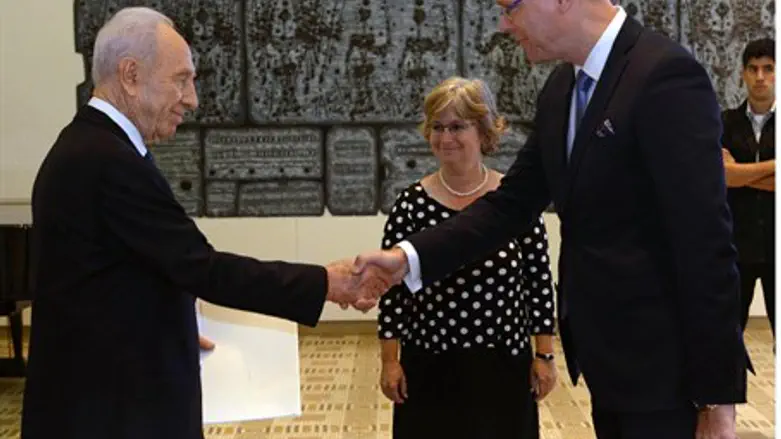
Sweden's ambassador to Israel said that his country's decision to recognize a "Palestinian state" was not meant to be an "anti-Israel" move.
The Israeli ambassador to Sweden, Isaac Bachman, was recalled over a week ago following the Swedish government's decision to officially recognize "Palestine" as a state on October 30.
Israeli Foreign Minister Avigdor Liberman responded harshly to the decision: "the Swedish government's [recognition of] a Palestinian state is a deplorable decision which only strengthens extremist elements and Palestinian rejectionism."
Previously thought to be one of Israel's best friend in Europe, the aftermath of Sweden's decision saw withering verbal jabs between Liberman and Swedish counterpart Margot Wallstrom, as well Swedish financial institutions boycotting Israeli companies.
Despite the tension, Carl Magnus Nesser, Sweden's ambassador to Israel, remains convinced that the crisis between the two countries is mostly overblown in the media, and that their relationship remains good.
In an interview with Walla! News, Magnus Nesser - who previously served at the Swedish embassy in Baghdad, Iraq - spoke on a number of aspects of the relationship between Sweden and Israel, highlighting that the disagreement over the Palestinian state is only one issue - and not necessarily the most important.
"We are very interested in the Israeli ambassador returning to Stockholm, because we have a commercial relationship as well as cooperation in such fields as economics, science, culture and education," Magnus Nesser said.
"Sweden believes in Israeli innovation and wants to promote cooperation in this field as well. There are also disagreements between us of course, but that's no reason to ignore all the good things that happen between the two countries."
Magnus Nesser also believes that Sweden's decision to recognize a Palestinian state is not anti-Israel, rather an attempt to strengthen moderate forces in the region.
"Our foreign minister clearly said that the purpose of this step is to encourage the moderate forces in the Palestinian Authority and the Arab world, who want to make peace with Israel through negotiations."
"We want to give hope to the moderates as part of our opposition to violence. We do not choose the side of the Palestinians or Israel; we are on the side of peace."
Magnus Nesser did insist that Sweden is committed to Israel's security believing that a peace agreement would be good for both her security and international standing.
He also came out against recent violence in Jerusalem, particularly last week's car terror attack. Sweden is "totally opposed to violence and terrorism, and this is a constant message that we give to both parties at all times. We will continue to denounce and condemn such incidents."
Finally, the Swedish ambassador expressed hope that the crisis between the two countries will soon be a thing of the past. According to senior officials at the Foreign Ministry in Jerusalem, his hopes may come true soon.
With the estimation that removing ambassadors from their posts will not deter other European countries from taking similar measures - following in the footsteps of both England and Sweden - Israel may need to formulate a more crystalized policy for dealing with the issue.